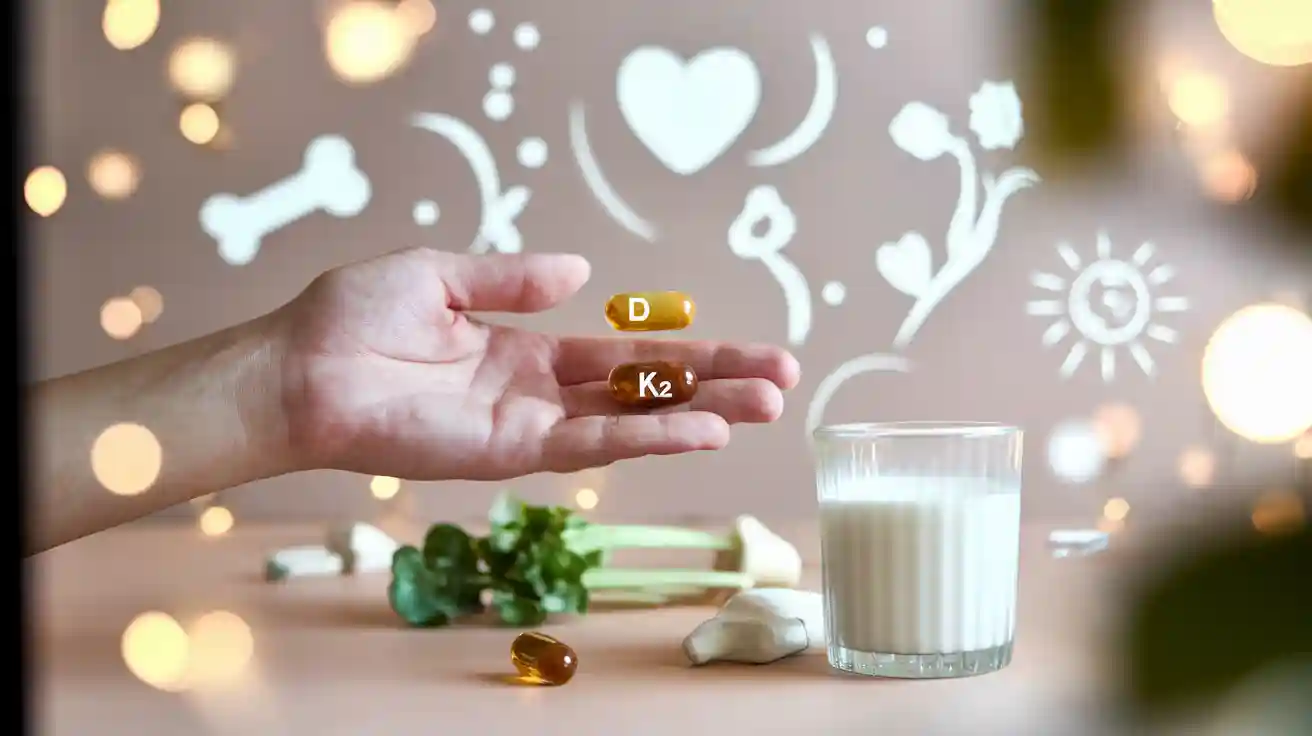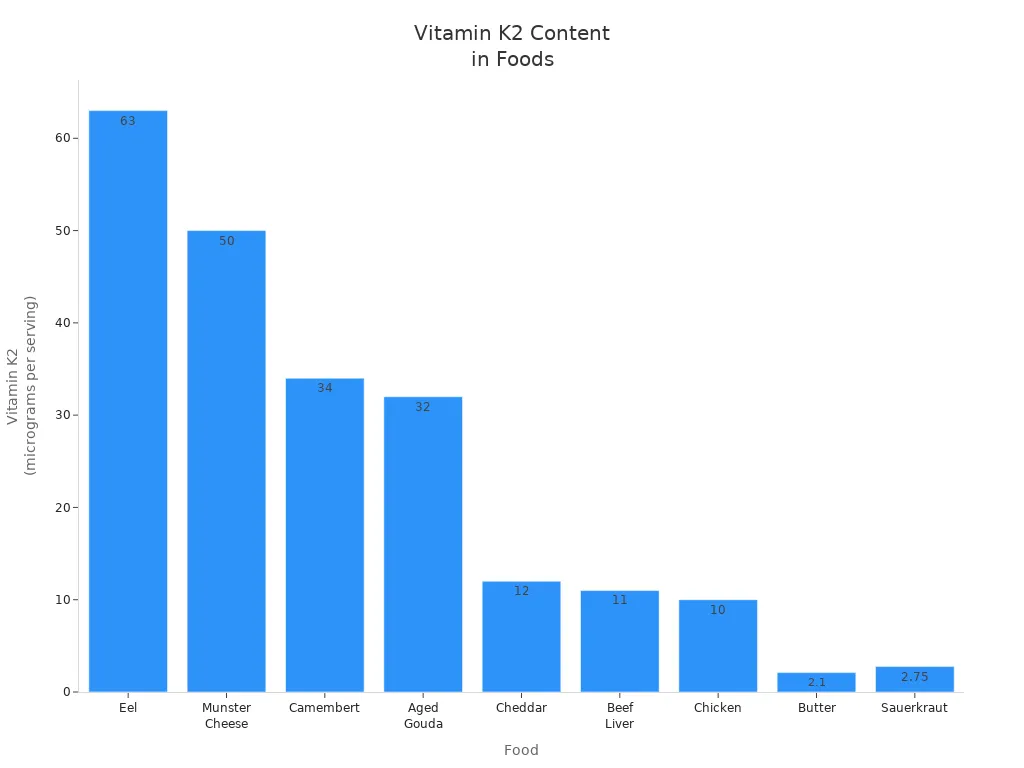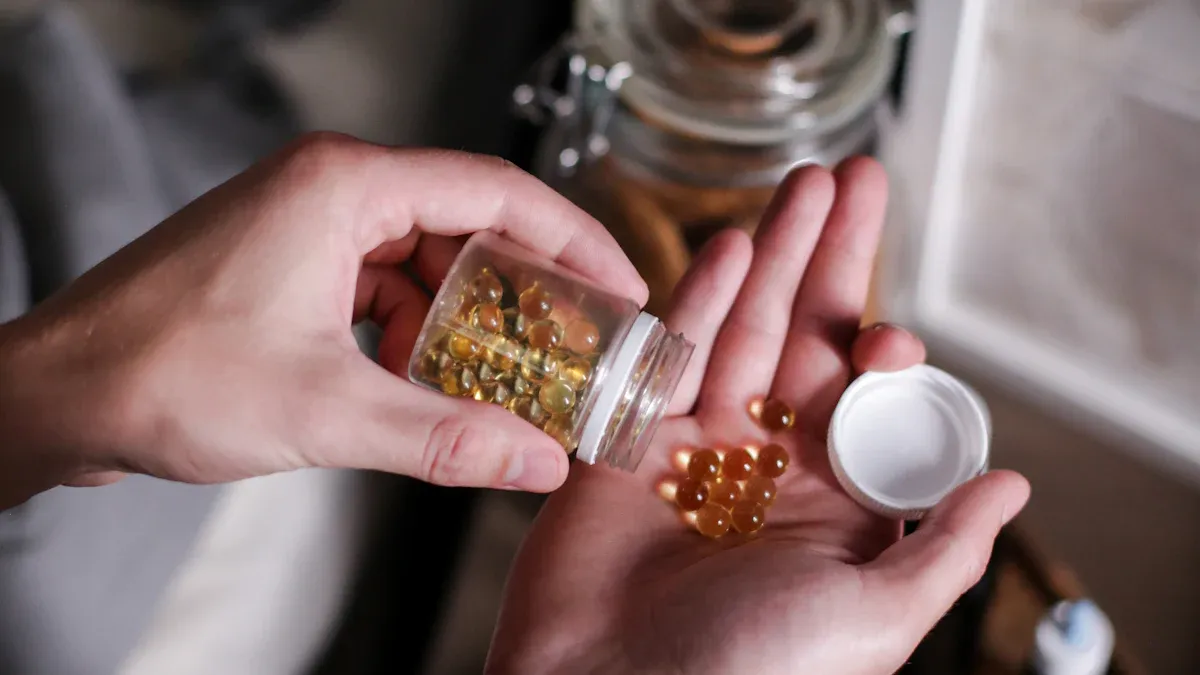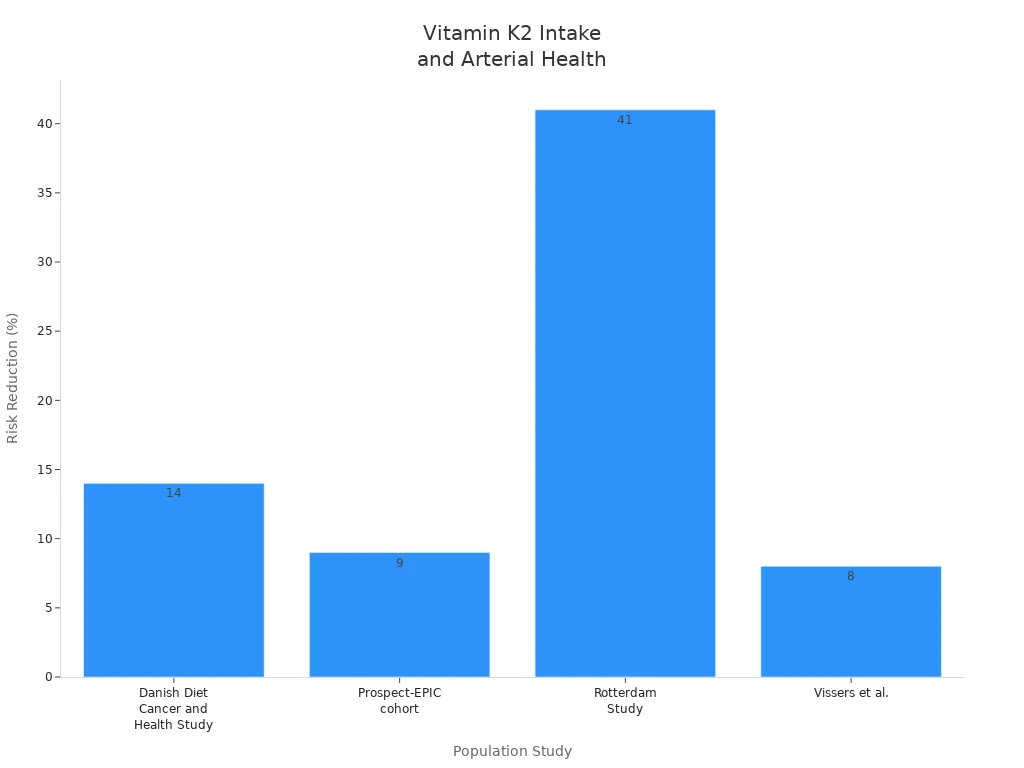Vitamin D and K2: Unlocking Health Benefits Made Easy
Table of Contents

Vitamin D and K2 work together in your body to unlock Health Benefits that support your bones and heart. Vitamin D helps your body absorb calcium. Vitamin K2 guides calcium to your bones, keeping your arteries clear. You can see their powerful effect in studies:
| Study Type | Findings | Odds/Hazard Ratio |
|---|---|---|
| Case-control (Norwegian older adults) | Low vitamin K1 and D linked to hip fractures | Odds ratio 7.6 |
You can take simple steps to boost vitamin D and K2. These steps help you feel stronger and healthier every day.
Vitamin D Basics

What Is Vitamin D
You need vitamin d for many important functions in your body. This nutrient acts like both a vitamin and a hormone. Your skin makes vitamin d when you spend time in sunlight. You also get vitamin d from certain foods and supplements. There are two main forms of vitamin d that you should know about:
| Form | Name | Description |
|---|---|---|
| D2 | Ergocalciferol | Found in some foods and supplements. |
| D3 | Cholecalciferol | Produced in your skin from sunlight and found in some foods and supplements. |
Vitamin d2 and d3 are both important, but d3 is the form your body makes naturally. You can find vitamin d in foods like fatty fish, cod liver oil, beef liver, egg yolk, and fortified foods such as dairy products, cereals, and plant milks. Some mushrooms exposed to UV light and fortified orange juice also provide vitamin d. Sardines are another good source.
Why It Matters
Vitamin d helps your body absorb calcium. Without enough vitamin d, your body cannot use calcium well, which can weaken your bones. The active form of vitamin d, called d3, controls how your intestines take in calcium. When you have enough vitamin d, your body absorbs calcium much better. If you do not get enough vitamin d, your calcium absorption can drop by over 75%. This can lead to serious health problems.
Low vitamin d levels link to many health issues. Studies show that not getting enough vitamin d can raise your risk for breast cancer, aggressive prostate cancer, erectile dysfunction, heart disease, and respiratory illnesses. You need vitamin d every day to keep your bones strong, your heart healthy, and your immune system working well.
Tip: Spending time outside in the sun helps your body make vitamin d3. If you stay indoors or live in a place with little sunlight, you may need to get vitamin d from food or supplements.
Vitamin K2 Essentials
What Is Vitamin K2
You may have heard about vitamin k2, but you might not know how important it is for your health. Vitamin k2 belongs to a group of nutrients called menaquinones. These nutrients help your body use calcium the right way. There are different types of k2, and each type works a little differently in your body.
| Type | Abbreviation | Isoprene Units | Source/Production Method | Bioactivity/Function |
|---|---|---|---|---|
| MK-4 | Menaquinone-4 | 4 | Synthesized from K1 in animal tissues | High bioactivity, distinct enzyme functions |
| MK-7 | Menaquinone-7 | 7 | Converted from K1 in the colon by bacteria | Higher bioavailability, longer half-life |
MK-4 comes from animal foods like meat and eggs. MK-7 is found in fermented foods, such as nattō, a traditional Japanese food made from soybeans. MK-7 stays in your body longer, so it can work for a longer time.
You can get vitamin k2 from many foods. Some of the best sources include:
| Food | Vitamin K2 Content (per serving) |
|---|---|
| Eel | 63 micrograms (100g) |
| Munster Cheese | 50 micrograms (50g) |
| Camembert | 34 micrograms (50g) |
| Aged Gouda | 32 micrograms (50g) |
| Cheddar | 12 micrograms (50g) |
| Beef Liver | 11 micrograms (100g) |
| Chicken | 10 micrograms (100g) |
| Butter | 2.1 micrograms (1 tbsp) |
| Sauerkraut | 2.75 micrograms (0.5 cup) |

Tip: Nattō is the richest source of vitamin k2. If you do not like nattō, you can try cheese, chicken, or sauerkraut.
Key Functions
Vitamin k2 plays a key role in your body. It helps activate special proteins that control where calcium goes. These proteins include osteocalcin, which helps build strong bones, and matrix Gla protein, which keeps calcium out of your arteries.
- Vitamin k2 activates osteocalcin, so your bones can use calcium to stay strong.
- K2 also activates matrix Gla protein, which stops calcium from building up in your blood vessels.
- Without enough k2, calcium may end up in the wrong places, like your arteries, instead of your bones.
- K2 works with vitamin D to keep your bones healthy and your heart safe.
Vitamin k2 helps your body use calcium wisely. When you get enough k2, you support your bones and protect your heart. You also lower your risk of bone and heart problems.
Note: Vitamin k2 is different from vitamin K1. K1 comes from leafy greens and helps your blood clot. K2 has special jobs in your bones and blood vessels.
Synergistic Relationship

How They Work Together
You unlock powerful health benefits when you combine vitamin d and vitamin k2. These two nutrients form a synergistic relationship that supports your bones and heart. Vitamin d3 helps your body absorb calcium from food. This process increases the amount of calcium in your blood. However, your body needs k2 to guide this calcium to the right places.
Vitamin k2 activates special proteins. These proteins move calcium into your bones and teeth. At the same time, k2 keeps calcium out of your arteries. Without k2, calcium can build up in your blood vessels. This buildup can lead to hard arteries and heart problems.
You can see how vitamin d and k2 work together in your body:
| Vitamin | Role in Arterial Calcification Prevention |
|---|---|
| d3 | Stimulates the synthesis of matrix-Gla proteins (MGP) which inhibit calcification. |
| k2 | Activates matrix-Gla proteins (MGP) essential for preventing calcification. |
Vitamin d3 starts the process by helping your body make matrix-Gla proteins. K2 finishes the job by activating these proteins. This teamwork keeps your arteries clear and your bones strong.
Clinical studies show the power of this synergy. In one study, people who took both k2 and d3 with calcium had a higher rate of bone healing and better bone health than those who took only d3 and calcium.
| Group | Treatment | Complete Fusion Rate | Serum P1NP Levels | BMD Changes |
|---|---|---|---|---|
| Experimental | k2 (45 mg/day), d3 (250 IU/day), calcium (1.2 g/day) | 91.67% | Higher at 3 months (P = 0.001) | Trend toward improvement |
| Control | d3 (250 IU/day), calcium (1.2 g/day) | 74.29% | N/A | N/A |
You can see that the group with both k2 and d3 had better results. This shows how important their synergy is for optimal health.
Why Balance Is Important
You need the right balance of vitamin d and k2 for optimal health. If you take high doses of d3 without enough k2, you may face risks. Your body will absorb more calcium, but without k2, this calcium may end up in your arteries instead of your bones.
Here are some risks of taking d3 without enough k2:
- Combined low vitamin d and k2 status was present in 20% of participants in a long-term study.
- This combination linked to a greater risk of death over 14.2 years.
- The risks from low levels of both vitamins were higher than from either one alone.
- High vitamin d intake may cause blood vessel calcification and heart disease if k2 is low.
- Vitamin d toxicity could promote vascular calcification, but k2 may help prevent this problem.
You can protect your health by keeping a good balance. Experts recommend a ratio of 100 mcg of k2 for every 10,000 IU of d3. This ratio helps your body absorb calcium and send it to your bones and teeth.
Tip: Always pair vitamin d with k2 to support calcium absorption and keep your arteries healthy. This simple step helps you reach optimal health.
The synergistic relationship between vitamin d and k2 makes it easy for you to get the most from both nutrients. When you keep them in balance, you support strong bones, a healthy heart, and better well-being.
Health Benefits
Bone Health
You need strong bones to stay active and healthy. Vitamin d and k2 work together to support bone health. D helps your body absorb calcium from food. K2 guides calcium into your bones, making them stronger. Without enough k2, calcium can build up in your arteries instead of your bones. This can cause problems for your heart and bones.
Many people do not get enough d or k2. You may notice weak bones, slow healing after injuries, or more fractures. When you get enough d and k2, you help your bones stay strong and flexible. D3 boosts calcium absorption, while k2 activates proteins that lock calcium into your bones. This teamwork leads to enhanced bone health.
Tip: Eating foods rich in d and k2, like fatty fish and cheese, helps you keep your bones strong.
You can see the benefits in real life. For example, older adults who take d and k2 have fewer hip fractures. Children who get enough d and k2 grow taller and have stronger bones. Athletes who focus on bone health recover faster from injuries.
Heart Health
Your heart works hard every day. You want to keep it healthy for life. D and k2 play a big role in heart health. D helps your body absorb calcium, but k2 makes sure calcium goes to your bones, not your arteries. If calcium builds up in your arteries, it causes calcification. This can lead to heart disease.
Population studies show that people who eat more k2 have healthier hearts. You can see the results in the table below:
| Study | Findings |
|---|---|
| Danish Diet Cancer and Health Study | 14% lower risk of ASCVD hospitalizations with higher vitamin K2 intake |
| Prospect‐EPIC cohort | 9% lower risk of coronary heart disease per 10 μg/day increase in vitamin K2 intake |
| Rotterdam Study | 41% lower risk of incident coronary heart disease in highest tertile of vitamin K2 intake |
| Vissers et al. | Dose-responsive reduction in PAD incidence with higher vitamin K2 intakes (HR per 10 μg/d higher intake, 0.92; 95% CI, 0.85–0.99) |

High k2 intake lowers the risk of calcification in your arteries. D3 helps your body make proteins that stop calcification, and k2 activates these proteins. This teamwork keeps your arteries clear and your heart strong.
You can protect your heart by getting enough d and k2. People who focus on heart health often eat foods like salmon, eggs, and aged cheese. These foods give you both d and k2. You may notice more energy and better blood flow when your heart works well.
Immunity
Your immune system keeps you safe from germs and sickness. D helps your immune system work better. It controls immune cells like neutrophils and macrophages. These cells fight viruses and bacteria. D also helps your body make special proteins called antimicrobial peptides. These peptides protect you from infections.
K2 supports immune function by working with d. When you get enough d and k2, your body fights off sickness more easily. You may notice fewer colds and faster recovery from illness.
- Preventive d supplementation lowers your risk of COVID-19 infection.
- Randomized controlled trials show d supplementation reduces the odds of getting COVID-19 by about 60%.
D also helps control inflammation. It stops your immune system from overreacting. This keeps you safe from problems like cytokine storms, which can make you very sick.
Note: Spending time outside helps your body make d3, which boosts immunity.
Well-Being
You want to feel good every day. D and k2 help you feel your best. D regulates serotonin, a chemical that controls your mood. Low d levels link to depression and anxiety. D also protects your brain and helps you think clearly. K2 works with d to support mental health and cognitive function.
| Evidence Type | Description |
|---|---|
| Vitamin D Role | Regulates serotonin levels, crucial for mood balance. Deficiency linked to depression and cognitive decline. |
| Cognitive Function | Protects neurons, improves cell communication, and reduces risk of neurodegenerative diseases. |
| Seasonal Affective Disorder | Supplementation improves mood in those with limited sunlight exposure. |
| Vitamin K2 Role | Enhances effectiveness of Vitamin D, contributing to mood regulation and cognitive health. |
| Cognitive Health | Vitamin K2 improves gut microbiota, reduces inflammation, and protects against cognitive decline. |
You may notice better focus and memory when you get enough d and k2. Students who take d and k2 often do better in school. Adults feel more alert and less tired. D3 helps your body make energy by supporting mitochondria. It also keeps your hormones balanced, so you feel steady throughout the day.
- D3 and k2 support mental acuity and academic performance.
- They help your bones, heart, and muscles work better, which reduces fatigue.
- D3 boosts energy production in your cells.
You can enjoy more energy and better mood by focusing on d and k2. People who get enough of these vitamins often feel happier and more active.
Easy Ways to Get Benefits
Diet Tips
You can unlock the benefits of vitamin D and K2 by making smart food choices. Fatty fish like salmon and mackerel give you plenty of d. Egg yolks and fortified foods, such as milk and cereal, also boost your d intake. For vitamin K2, try natto, sauerkraut, kimchi, and grass-fed dairy. These foods help you get the most from combined supplementation. Eating a variety of these foods supports your bones and heart.
| Food Source | Vitamin D | Vitamin K2 |
|---|---|---|
| Salmon, mackerel | High | Low |
| Egg yolks | Moderate | Moderate |
| Fortified milk/cereal | High | Low |
| Natto, sauerkraut | Low | High |
| Grass-fed cheese | Low | High |
Tip: Include fermented foods and animal products in your meals to maximize the benefits of d and K2.
Supplement Advice
Supplementation makes it easy to meet your daily needs, especially if you live in northern regions or spend little time outdoors. You should follow recommended dosages for safety and effectiveness.
| Vitamin | Recommended Daily Dosage |
|---|---|
| D | 600 IU (15 mcg) for ages 1-70; 800-1000 IU (20-25 mcg) for osteoporosis |
| K | 120 mcg for men 19+; 90 mcg for women 19+ |
Combined supplementation of d and K2 supports bone and heart health. Most healthy adults can safely use supplementation within suggested amounts. If you take blood thinners, keep your vitamin K intake consistent. People with health conditions like hypercalcemia should talk to a healthcare professional before starting supplementation.
Note: Do not exceed 4,000 IU of d daily. Signs of d toxicity include nausea, vomiting, and confusion. Stop supplementation and consult a doctor if you notice adverse reactions.
Lifestyle Habits
Simple habits help you absorb and use d and K2 more effectively. Aim for 15-20 minutes of midday sun a few times each week. Direct sun exposure on your arms and face boosts d production. Pollution and limited sunlight can lower your d levels, so outdoor time matters. If you live above 50°N latitude, your d status drops in winter. Supplementation helps maintain healthy levels.
- Spend time outdoors to increase d.
- Eat foods rich in d and K2 for combined supplementation benefits.
- Maintain a balanced diet and active lifestyle.
You gain the benefits of strong bones, a healthy heart, and better well-being by following these easy steps.
You can unlock better health by combining vitamin D and K2. These vitamins help your bones, heart, and immune system work well. Recent research shows that people taking both vitamins saw fewer long COVID symptoms and less inflammation.
| Key Findings | Description |
|---|---|
| Study Design | Randomized controlled trial with 151 adults |
| Treatment | Daily K2 MK-7 (240 µg) and D3 (2000 IU) for 24 weeks |
| Results | Improved fatigue, body pain, and overall symptoms |
People with low vitamin D levels have more heart risks. You can check your vitamin levels, use tools to track progress, and retest after a few months.
Take simple steps today. Choose foods rich in vitamin D and K2, spend time outside, and consider supplements if needed. You have the power to feel stronger and healthier every day! 😊
FAQ
How do you know if you need more vitamin D or K2?
You can ask your doctor for a blood test. Low energy, weak bones, or frequent sickness may mean you need more.
Tip: Sunlight and a balanced diet help you get enough.
Can you take vitamin D and K2 together?
Yes, you can take both at the same time. They work best together.
| Vitamin | Benefit | |–|–| | D3 | Absorbs calcium | | K2 | Directs calcium |
What foods give you vitamin D and K2?
You find vitamin D in salmon, eggs, and fortified milk. You get K2 from cheese, natto, and sauerkraut.
🍳 Try eggs for both vitamins.
Are there side effects from taking too much?
Too much vitamin D can cause nausea or confusion. High K2 is usually safe.
Note: Always follow the recommended dose on the label.

Poseidon
Master of Nutritional Epidemiology, University of Copenhagen, Herbal Functional Nutrition Researcher
Focus: The scientific application of natural active ingredients such as Tongo Ali, Horny Goat Weed, and Maca to sexual health and metabolic regulation.
Core Focus:
Men: Use a combination of Tongo Ali (an energizing factor) + Maca (an energy reserve) to improve low energy and fluctuating libido.
Women: Use a combination of Horny Goat Weed (a gentle regulator) + Maca (a nutritional synergist) to alleviate low libido and hormonal imbalances.
Stressed/Middle-Aged Adults: This triple-ingredient synergy supports metabolism, physical strength, and intimacy.
Product Concept:
Based on traditional applications and modern research (e.g., Tongo Ali promotes testosterone-enhancing enzyme activity, and icariin provides gentle regulation), we preserve core active ingredients and eschew conceptual packaging—using natural ingredients to address specific needs.
Simply put: I'm a nutritionist who understands "herbal actives." I use scientifically proven ingredients like Tongo Ali, Epimedium, and Maca to help you make "sexual health" and "nutritional support" a daily routine.
